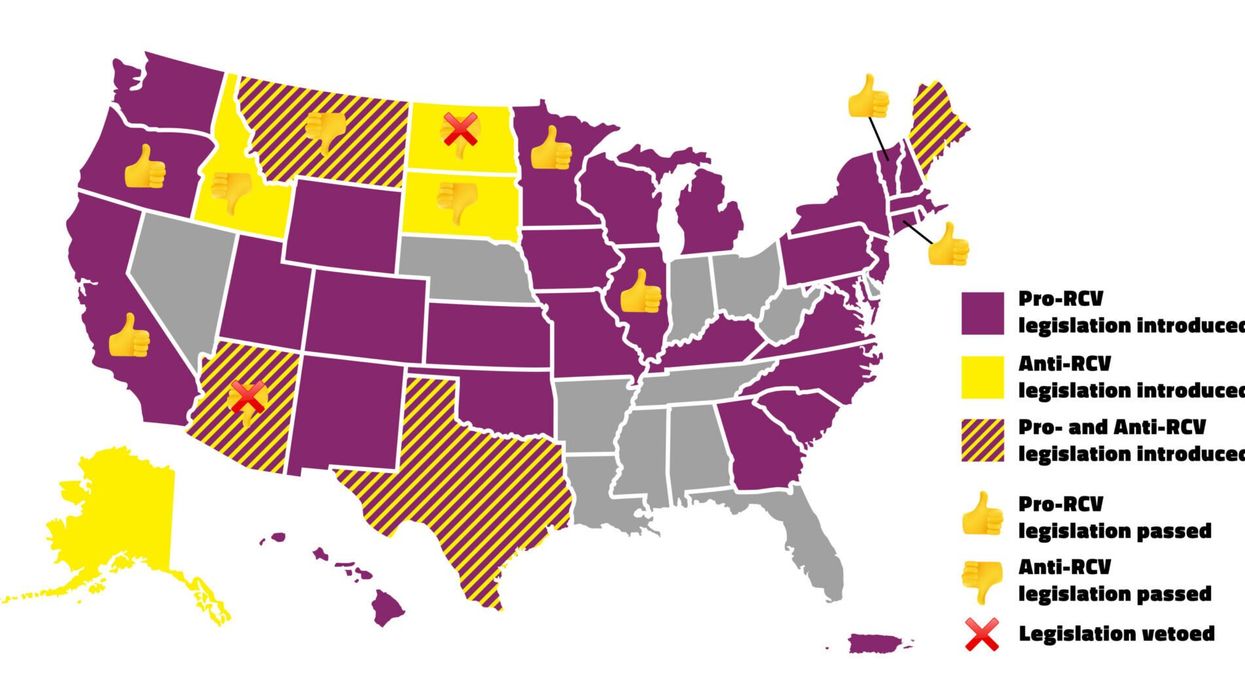O’Brien is the policy director for RepresentUus. Kearney is a policy analyst for RepresentUs.
One of the first things you notice when you start researching proposed election laws is that there are a lot of them.
Hundreds. Thousands even. And more are introduced every year. This can make it hard to keep track of what’s going on in the world of democracy reform. Who’s considering proposals you like? Who’s trying to do things you hate? Who’s working on things you’ve never even heard of?
Another thing you’ll notice is that it can be hard to categorize proposed election laws. Is it a minor, technical adjustment or a significant change to the election process? Does it cover a single, discrete subject or several?
As members of the policy team for RepresentUs, an organization that works to pass pro-democracy laws (and defeat anti-democracy ones) across the country, we try to keep track of the various proposals that get introduced every legislative session. There are some excellent tools to track proposed election laws and other reforms already but most of them are either narrowly focused on a specific topic or broadly focused on all election legislation. After years of waiting for a single resource that covers all state legislation across our areas of interest, we decided to make it ourselves: “ States of Reform: The 2023 RepresentUs Legislative Landscape Aanalysis.”
Many of the subjects in this report cover our main areas of advocacy. Others are policies with exciting potential that we’re keeping an eye on. This list of proposals includes pieces of legislation that we supported and promoted as well as others that we opposed. A proposal’s inclusion in this report doesn’t necessarily mean that we support or endorse it.
We have tried to make this report as comprehensive as possible without being overwhelming. In that spirit, it focuses on:
- Legislatures. This report only tracks proposals that were introduced in legislatures. It doesn’t include attempts by members of the public to place questions on the ballot through an initiative process. Referrals by legislatures to place ballot measures on the ballot for public approval are included in this report, but initiatives that qualify for the ballot through a signature drive, without first going through a legislature, are not. It also doesn’t include changes in rules and regulations by state agencies.
- Legislation. This report only tracks proposals that, if passed, would change the law. Bills and resolutions that would either change laws directly or refer questions to the ballot are included, while other legislative actions that wouldn’t change the law or otherwise affect how elections are conducted (such as committee hearings or symbolic resolutions declaring support or opposition to the subjects of this report) are not.
- States. This report only tracks proposals introduced in state legislatures. It doesn’t track proposals in Congress or local legislatures, like city councils. Many of these proposals would affect federal and local elections, but they are all introduced at the state level.
Even with these restrictions we had to make some difficult calls. “Campaign finance,” for example, is such a big topic that it could be its own report. We decided to focus on a few subcategories of that topic with the most exciting potential for growth. Every section provides a brief description of the subject area and an explanation why we think it’s worth monitoring.
It’s our hope that, in a time of pessimism about the future of democracy, this report conveys how active and vibrant the democracy movement is. We also hope that democracy advocates will use the information in this report to inform their efforts, helping them to decide what and where the greatest opportunities and threats are.



















